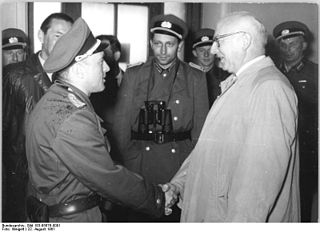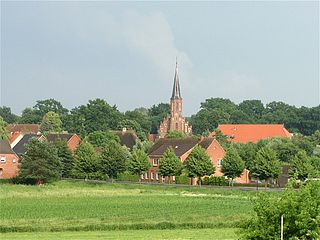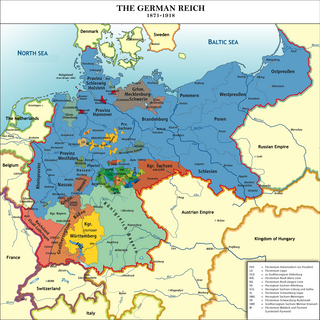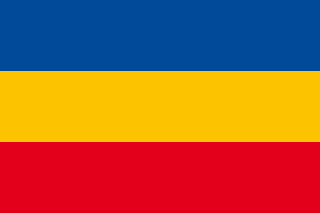
Petra Pau is a German politician of The Left. She has been a member of the Bundestag since 1998. Since 2006, she has also served as one of the Vice Presidents of the Bundestag, being the first member of her party to hold this office. Pau belongs to the reform-oriented wing of her party, actively supporting parliamentary representative democracy.

Ernst Goldenbaum was an East German politician.
The Volkseigenes Gut was a state-owned farm in the German Democratic Republic (GDR), corresponding to the Soviet Sovkhoz and the Państwowe Gospodarstwo Rolne in the People's Republic of Poland. In contrast to the Landwirtschaftliche Produktionsgenossenschaft (LPG) or collective farm, another form of state agricultural enterprise, the VEGs were often the successors to former private farms which resulted from the land reform in the Soviet sector of Germany mandated in the Potsdam Agreement of 1945.

Banzkow is a municipality in the Ludwigslust-Parchim district, in Mecklenburg-Vorpommern, Germany. Since 2009 it has included Goldenstädt.

History of Pomerania (1945–present) covers the history of Pomerania during World War II aftermath, the Communist and since 1989 Democratic era.
Erich Wiesner was a German communist politician and last German Mayor of Stettin.

East Elbia was an informal denotation for those parts of the German Reich until World War II that lay east of the river Elbe.
Friedrich Wehmer was a regional politician in Germany during the Weimar period and a national politician in the German Democratic Republic after the war.
Hannelore Mensch is a former East German politician. She served as the German Democratic Republic's Minister for Work and Wages in 1989/90.

Angelika Gramkow is a German politician.

Sylvia Bretschneider was a German teacher, education administrator and politician (SPD). She was a member of the Landtag of Mecklenburg-Vorpommern between 1994 and 2017, taking over as speaker of the state parliament in 2002, and serving in that office, formally, till her death.
Herta Geffke was a German activist and politician who resisted Nazism. After 1945 she became a member of the Party Central Control Commission in the Soviet occupation zone, identified as a "true Stalinist" and feared on account of her interrogation methods.

The State of Mecklenburg was a subdivision of the Soviet occupation zone and one of the states of East Germany which corresponds widely to the present-day German state Mecklenburg-Vorpommern. The state was originally formed as an administrative division, the State of Mecklenburg-Vorpommern, by the Soviet Military Administration in Germany (SMAD) in July 1945. It consisted of the 1934-established Mecklenburg and parts of the former Prussian provinces of Pommern and Hanover. The city of Swinemünde was handed over to Poland in October 1945, becoming part of Szczecin Voivodeship. In November 1945, a transfer of small territories along the Inner German border to the former Province of Schleswig-Holstein was carried out as part of the Barber–Lyashchenko Agreement. About 2.1 million people were estimated to live in Mecklenburg in 1946. From 1947, the term Vorpommern was excluded from the official name as the SMAD feared that this would support revisionist actions against formerly German parts of Poland. Compared to the administrative divisions of Nazi Germany, Mecklenburg comprised the Gaue Mecklenburg and parts of Pomerania and Eastern Hanover.

The State of Brandenburg was a subdivision of the Soviet occupation zone and state of East Germany which corresponds widely to the present-day German state Brandenburg. The state was originally formed as administrative division Province of March Brandenburg by the Soviet Military Administration in Germany (SMAD) in July 1945, a re-establishment of the Prussian Province of Brandenburg, excluding the Eastern parts behind the Oder–Neisse line to Poland. With the abolition of Prussia in February 1947, it was named State of March Brandenburg but in June 1947 the SMAD forced to change the name to State of Brandenburg. In August 1945, a transfer of territory was ruled out between Allied-occupied Berlin. Compared to the administrative divisions of Nazi Germany, it comprised the Western part of the Gau March Brandenburg and small parts of Berlin.

Gottfried Drechsel was an East German functionary of the Peasants Mutual Aid Association and politician. He sat in the People's Chamber between 1986 and 1990.

Else Merke was a member of the State Council of East Germany, the country's collective head of state, from 1963 until 1971.
Brunhilde Hanke is a German retired politician who was mayor of Potsdam and a member of the State Council of East Germany.

Margarete Müller is a German retired politician who was a member of the State Council of East Germany and, between 1963 and 1989, of the Central Committee of the Socialist Unity Party of Germany (SED). She was a candidate member of the SED politburo until the end of the one-party system.

State elections were held in the Soviet occupation zone of Germany on 20 October 1946 to elect the state legislatures of Mecklenburg-Vorpommern, Brandenburg, Saxony, Saxony-Anhalt and Thuringia. They were the only elections held in the future territory of East Germany before the establishment of the German Democratic Republic in 1949, and the only free and fair elections in that part of Germany between 1932 and the Peaceful Revolution.

Birgit Pommer is a German politician of The Left who has served as President of the Landtag of Thuringia since November 2019. She is the first member of her party to serve as speaker of any state parliament. Prior, she served as Minister for Infrastructure and Agriculture in the first Ramelow cabinet.













